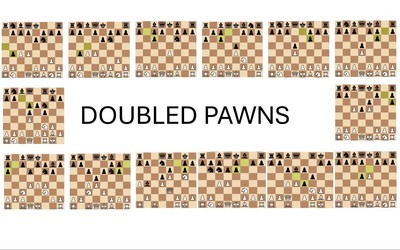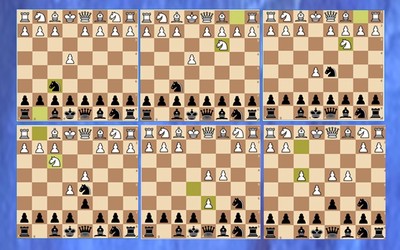
"Lydia Thinking on a game of Chess" by Seth W. is licensed under CC BY-SA 2.0.
The longer I think, the worse my move?
To think or not to think, that is the question. Should we move first, think later as Willy Hendriks suggests? Or should we rely on hard calculation as all the books promoting better calculation demand? In this post we'll review the arguments and look at what the data shows for blitz and classical chess.How often have you thought for a really long time and then blundered? And even the weakest of us can sometimes string together a series of quick and strong moves in a blitz game. It's tempting to think that thinking is a waste of time...
How we think
It's now widely accepted that we have two main ways of thinking. One is a quick, instinctive way which works subconsciously, for example when we are driving a car day in day out. That approach may originate from times when humans were escaping from predators and needed to think and act quickly. In chess terms it's the move that immediately pops into your head when you see a position.
The second is laying out all the options in a structured way and then pondering what the best solution is. In chess terms this is making an assessment of the position, a mental list of candidate moves, possible opponent responses and choosing the optimal choice from a tree of options. A big downside of this approach is that it takes lots of time to do well. Not much use if you are being chased by a lion. Not much use either if you are playing chess on a couple of seconds increment per move.
An example of how we think
In the game above my opponent Donald Mason has daringly sacrificed a piece and I (White) have an option of taking a second. Now in a blitz game there's no way you could calculate everything and so you would need to make a move more on instinct. The daring might take the knight on h5, whilst the cautious might retreat with the king, perhaps to h3. Or you might just pick some other move which comes quickly to mind.
With more time you could try to set up a structured analysis process as recommended by GM Kotov in Think Like a Grandmaster. He urges an approach along the lines of the tree diagram below.

I've only started the sort of tree you would need, starting with eight options A-H and then branching out according to possible replies. To be honest completing this approach would be too complex for almost all chess players.
In the game I tried to be somewhat systematic but also relied somewhat on instinct. I went for option G which according to the engine is best. And engines are absolutely the best at structured calculation! Later on my decision making wasn't so good and Donald won a nice game.
I invested 9 minutes on the initial decision which feels reasonable for a classical game with 90 minutes and 30 seconds increment. I'm doubtful that I would have made a much better decision on average if I'd spent say 30 minutes.
Let's move on and look at some data on how long players do spend on decisions and how good they are.
How move strength and time spent thinking compare for blitz
First up we have some data on blitz games on Lichess. You can get similar data for yourself and anyone that makes it public by looking on your profile page under Insights.
The data shows information for GM Andrew Tang who is exceptionally fast and strong and three club players:
- Phil (me) around 2200 on a good day
- Liflitz around 2300 and
- Steve who is rated <2000 normally (partly because he loves to berserk).
Andrew Tang manages to play over half of his moves in less than a second. We can't all play that fast but notice how Steve and Liflitz manage around 20% of their moves in less than a second. I'm much slower at 11% and could look to improve here.
The table also shows error rates in centipawns against the engine-approved "best" move. It's maybe surprising at first glance that the error rates go up as each player spends more time on decisions. For example I lose 88 centipawns when I spend more than five seconds on a decision.
Should I be spending less time on those decisions? Probably not. It's just that these are the trickiest decisions and that even investing time doesn't lead to such an accurate move. The moves played within a second will include known openings, known plans, premoves, automatic recaptures and so on.
How blunders and time spent thinking compare for classical
How about classical games? Well for live games there isn't the same data available as for online blitz. However I did crunch the data on around 300 classical games played in the English Championships in 2022. This included an open section, a women's section and two sections for old folk (including me!)
I put all the 300 games through a blunder check and correlated 300 centipawn plus errors (blunders) with the thinking time for each player. At these speeds the pattern is different from blitz. There really doesn't seem to be much of a difference between spending 0-2 minutes or say 8-10 minutes.
The data gets a little more varied as thinking times approach twenty minutes, partly because there are fewer data points for such long thinks. There is, however, tentative support for cutting short your thinking if you are really struggling as it may well be that extra thinking won't add much. The time you save may well come in handy later on.
So what?
There is a way to synthesise these competing approaches of playing intuitively and using hard calculation. We should use intuition for straightforward, even automatic decisions like recapturing a piece. We should use calculation when multiple pieces are hanging or when one or more kings are under vicious attack.
There's a grey area in between where intuition can help us select a few candidate moves. We can then calculate our preferred move from this shortlist.
In blitz the time constraints will force us to rely more on intuition than we might like. The stronger we are at chess the more likely that intuition is likely to be effective. In classical we have the luxury of more choice about how much time we allocate for different decisions. Especially in blitz but also in classical we should aim to save time by making our thinking and move execution as quick as possible.
You may well want to check out your own Insights data to see if there are any clues for how you can do better at using your time.
If you liked the discussion above then please "like" it and I may tackle some other topics if there is interest. Please feel free to comment in the forum.
If the topic of how we can make best use of our time interests you then you could look at my latest book available on Amazon: Better Chess Faster: Strategies for online and live play: Amazon.co.uk: Crocker, Mr Phil: 9798829874704: Books
More blog posts by Schadenfreude__gut

Doubled pawns: in 14 flavours
Whether they are good or bad there is something a bit sinister about how doubled pawns are normally …
Understand Alekhine's Defence in six diagrams
The Alekhine is a combative opening which can do particularly well at blitz and can pose immediate p…
Improve your blitz results in eight steps
Have you ever wondered if there are some easy ways to make you faster and more dangerous at blitz? H…

